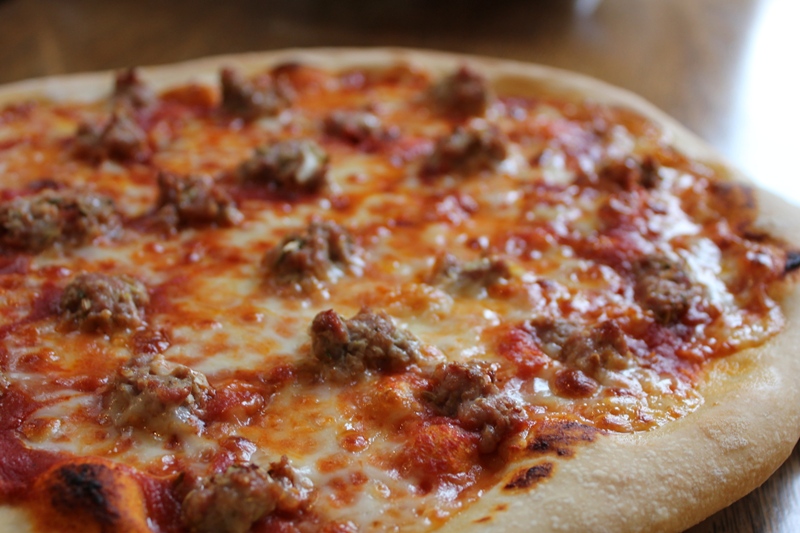
Neapolitan Pizza v3 (and new choices for pizza dough in Groningen)
 One of the advantages of living in a small city like Groningen is that you can get to know the people responsible for the food you purchase and eat. One of the most interesting developments in the Groningen food scene the last few years was the opening of the Stadsbakker Meijer, near the Harmonie building. The owner/baker Wim Meijer has been offering consistently excellent products, using both traditional and innovative recipes and processes. So it came as little surprise when he agreed to help me out on this new little project, the development of ready-to-use, bake-at-home pizza dough!
One of the advantages of living in a small city like Groningen is that you can get to know the people responsible for the food you purchase and eat. One of the most interesting developments in the Groningen food scene the last few years was the opening of the Stadsbakker Meijer, near the Harmonie building. The owner/baker Wim Meijer has been offering consistently excellent products, using both traditional and innovative recipes and processes. So it came as little surprise when he agreed to help me out on this new little project, the development of ready-to-use, bake-at-home pizza dough!
Now, you might ask why I want to make pizza at home, instead of picking up the phone for delivery. The answer is that it is better, cheaper, and more fun to make at home, using ingredients that you know are top quality and fit your tastes perfectly. All you need is some dough, some sauce, and a few toppings of your choice. You can make your own dough, of course, but Wim has made this much easier for all of us by offering dough in convenient, single-pizza portions for €1 each! So, get out and buy one of them and follow the steps below to make the best pizza in Groningen, hands down!
Ingredients (per pizza)
1 pizza dough from Stadsbakker Meijer
200gr mozzarella
50gr grated Parmigiano-Regiano
A can of peeled whole tomatoes
Fresh basil
Olive oil
Salt/pepper
Toppings of your choice
The Dough
About three hours before cooking, take the dough out of the fridge (and the bag) and place it on a well-floured surface. Flour the top of the dough and shape into a rough ball. Place this in a large, floured bowl and cover with a towel or plastic wrap. Let the dough rise in a warm room for two hours. In the meantime, you can prepare the sauce and toppings.
The Sauce
I favour using an uncooked sauce, as it will cook on the pizza anyway. It saves time and the taste is sweeter and more vibrant. Empty the can into a fine sieve, remove the green stems and cut open the tomatoes. Let them drain all their water out for 15 minutes and then crush roughly with a fork. Season with salt and add a few shredded basil leaves.
The Cheese and Toppings
The cheese is, of course, always mozzarella. Do not be tempted to use Dutch cheese; reserve that for other things, it has no place on pizza. To avoid a soggy pizza, slice the mozzarella in advance, drain the liquid and keep it in the fridge while the dough rises, so it dries out.
The toppings are your choice, but I can tell you my favourite is sliced wild mushrooms from the market, marinated for a few minutes in olive oil and seasoned with salt and pepper (about 100gr per pizza).
Cooking the Pizza
Forty-five minutes before cooking, turn your oven on to its maximum temperature and let it preheat, with the oven rack just a bit higher than the middle. Professional pizza ovens reach temperatures of 800˚C, which we cannot recreate at home, but we can try our best by letting the oven heat up to the max. Place a metal roasting pan on the oven rack, upside down so there is a smooth, flat surface for your pizza to cook on (the size of the pizza will depend on the size of this pan, of course). Fifteen minutes before cooking, switch the oven to the grill setting so you can really max out the temperature on the pan. Now is the time to put everything together.
Cut a piece of baking paper a bit larger than the pizza and flour it and your hands lightly. Take the dough gently out of the bowl and flatten it, while rotating, to make a circle. Precision is not so important, as long as the circle is thin with a slightly thicker edge. Transfer the paper with the dough on a wooden board (this helps you transfer the pizza to the oven) and cover the dough with a thin layer of sauce, leaving the edges dry. Sprinkle the Parmigiano-Reggiano and lay the slices of mozzarella and toppings over it. Working quickly, turn off the grill and return the oven dial to the maximum temperature, slide the paper with the pizza onto the metal oven pan. Close the door and let the pizza cook for about 10-12 minutes, or until the cheese is golden brown and the edge is slightly charred from the heat. When this is achieved, slide the pizza out onto the board and serve.
Links: http://www.uwstadsbakker.nl/
Price per pizza: €3
Notes:
- If you have a pizza stone, by all means, use that instead of the inverted-pan method (though, I suggest you try that too; it works remarkably well).
- You can use a rolling pin to roll out the dough, if you prefer.
- If you buy the dough frozen, it will take an extra hour or two to rise (or let it defrost in the fridge for a few hours and use the method above).
- Use fresh tomatoes instead of canned, if you like, or indeed any ready-made sauce you find acceptable (the uncooked tomatoes are better, though).
